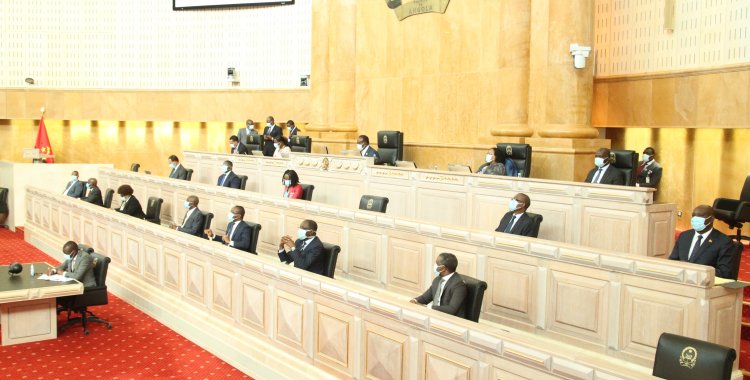The document was approved with 141 votes in favor of MPLA and the National Front for the Liberation of Angola (FNLA), 48 against UNITA, the Broad Convergence for the Salvation of Angola - Electoral Coalition (CASA-CE) and independent deputies. Those elected from the Social Renewal Party (PRS) and an independent deputy abstained.
In its explanation of vote, the UNITA parliamentary group said it voted against because the state budget for 2021 clearly does not present an economic policy strategy to promote real growth in gross domestic product (GDP) in the oil sector, based on objectives whose goals remain unachievable, since the macroeconomic scenario of the present budget "brings a trivial tide of uncertainty.
According to UNITA's second vice-president, Navita Ngola, the vote was not in favor either because of the inclusion of projects in the State Budget with meagre figures, which would later be altered in the framework of budget execution.
"We understand this exercise as an act of predisposition to theft and embezzlement. We believe that feasible and priority projects that contribute to the recovery of the economy should be registered in an effective and efficient way", he said.
In turn, the parliamentary group of CASA-CE considered that the GSB for the economic year 2021 is incapable and inadequate "to reduce the condition of extreme poverty and misery in which most Angolans are plunged.
According to Manuel Fernandes, the theory that a large part of the budget of this State Budget has privileged the social sector, "in fact, more than the percentages expressed in this law should benefit from concrete projects to improve the quality of services to be provided that are reflected in the lives of the most disadvantaged citizens.
"CASA-CE's vote against is based on the fact that the GSB for 2021 lacks non-financial data, and the information it contains is not sufficiently clear and comprehensive in relation to what the applicability of public money will be," he said.
For his part, Benedito Daniel, of PRS, said that he abstained because he understood that the debate on the GSB proposal is an opportunity for active citizen participation in governance and management of the public interest and common good, which he considered not to have occurred.
"This requires a posture of open dialogue of the executive, so that there is a joint exercise between the executive, the legislative and the citizen, to build consensus, taking into account that we leave or have different options as to priorities," he said.
On the other hand, MPLA deputy Paulo Pombolo said that approving the OGE for 2021 means, among others, strengthening the diversification of the economy, reanimating the national productive sector, supporting the working class, maintaining and creating new jobs, especially for young people.
"Given the reduction in revenues resulting from the drop in the price of oil barrels, the main source of tax revenue, and aggravated by the emergence of the covid-19 pandemic, the GSB for 2021 is realistic, prudent and will contribute to the expected revenues to cover in reality the expenses foreseen in this budget," he said.
Paulo Pombolo criticized the opposition parties that voted against the OGE's proposal, recalling that there is no record in the National Assembly of favorable votes from the opposition concerning the State General Budget.
"By voting against the opposition, he is saying no to improving conditions of health, education, work, access to water and energy, to respond even to the pressures caused by the pandemic and to deny that the executive will create the conditions for the acquisition of vaccines as soon as they are available," he stressed.
In statements to the press, Finance Minister Vera Daves said that the execution of the State Budget for next year "is a challenge that everyone must take up, join forces, have commitment, focus, to ensure that the expectations that are being created now with your approval are not disappointed.
"More important now is to ensure that everything we project comes true, both on the revenue and expenditure side and that all expenditure that is executed is in accordance with the law, respecting good public procurement practices, so that the end result is an effective improvement in the social and economic living conditions of all Angolans," he said.
The OGE for 2021 estimates expenditures and revenues of 14.7 billion kwanzas, with reference to the price of a barrel of oil at $ 39.
The proposal foresees applying a sum of 841.5 billion kwanzas for health (5.6 per cent). About 39.5 percent of the budget will be allocated to the social sector, 15.5 percent to the economic sector and 6.83 percent to education.
The GSB 2021 also foresees an inflation rate of 18.7 percent and a growth of 2.1 percent in non-oil output. On this last point, the government estimates that the non-oil economy will show its best performance since 2016.
The GSB 2021 proposal presents a fiscal deficit of about 2.2 percent of GDP. However, in November, Finance Minister Vera Daves said that although the document presents uncertainties, it should grow 9.9 percent compared to the GSB forecast for this year (which was set at 13.4 billion kwanzas).
Angola will register negative growth rates for the fifth consecutive year, with a recession of around 3.3 percent expected by the end of this year and a zero global growth rate for 2021.







